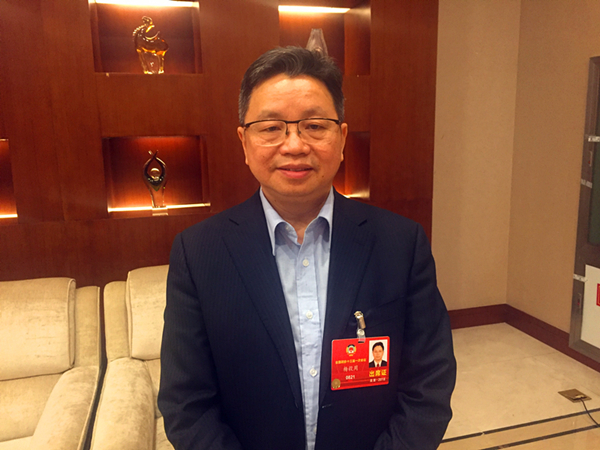?CPPCC member from Taiwan: Cross-Strait exchange is the only path for the future
- By Zhang Rui
 0 Comment(s)
0 Comment(s) Print
Print E-mail China.org.cn, March 15, 2018
E-mail China.org.cn, March 15, 2018
A political advisor from Taiwan said in Beijing on Tuesday that exchanges between the Chinese mainland and Taiwan, and their relationship, will grow closer despite hurdles set by some political powers.

Yang Yizhou, vice chairman of the All-China Federation of Taiwan Compatriots and a member of the 13th National Committee of the Chinese People's Political Consultative Conference (CPPCC), said he finds it strange that Taiwan authorities fear the mainland's newly released "31 favorable measures for Taiwan people."
"Those measures actually benefit Taiwan's compatriots, so why should they be afraid? They even claimed they will put out counter-measures, reflecting their problematic mindset and policies," Yang said.
The 31 measures were unveiled by the Taiwan Affairs Office of the State Council and the National Development and Reform Commission in February, and cover several areas such as industry, taxation, employment, education and culture. The measures will also relax restrictions and promote collaboration across the Strait.
"Greater exchange, greater cooperation and greater development are the big trends for the mainland and Taiwan," he commented, adding, "Although government-level communications may be at a low point due to Taiwan leader Tsai Ing-wen's failure to acknowledge the 1992 Consensus on the one-China principle, civil exchanges between the two sides have become broader and deeper in the past five years. The mainland and Taiwan are moving toward integrated development."
The firm economic relationship and development between the two sides indicates how closely linked they are. Huang Songping, spokesperson of the General Administration of Customs, told the press in January that bilateral trade between the mainland and Taiwan reached 1.35 trillion yuan (US$207.7 billion) in 2017, a year-over-year increase of 14 percent. The mainland's trade deficit against Taiwan reached 753.4 billion yuan (US$115.9 billion), up 15.4 percent.
Besides the enormous volume of trade, regular mechanisms of exchange have also become more popular, while the grass-roots community of Taiwan has grown closer with mainland communities. Religious and folk cultural exchanges have also increased.
"No matter who is leading Taiwan, he or she dares not cut off cross-Strait trade and exchange," Yang said. "Though relations between the two sides have not always been smooth, Taiwan authorities were forced to relax many things in the past. To break the current ice between the two sides, it is up to the leader of Taiwan to make the move and change her policies."
The political advisor pointed out that after 40 years of Chinese reform and opening-up, the mainland grew rapidly and became more prosperous and stronger than Taiwan. "In the past, Taiwan was a symbol of wealth, and many mainland girls wanted to get married to men from Taiwan and live there. Now many people from Taiwan get married and live in the mainland," He said.
But the mainland's booming growth and Taiwan's more dampened growth might create misunderstandings or prejudice against the mainland among some of Taiwan's young people, said Yang. "They are just unwilling to face reality, but more communication will help solve the problem in the future."
He appealed to more people from Taiwan to come see the real mainland for themselves, instead of listening to biased media reports or being unduly influenced by certain powers.
"Cross-Strait relationships will grow closer and closer. This is the wheel of history that no one can stop -- not some unwise political powers, not even the United States which wants to exploit Taiwan as a card to play," he added. "Taiwan has no other path to follow but to grow together with the mainland."





